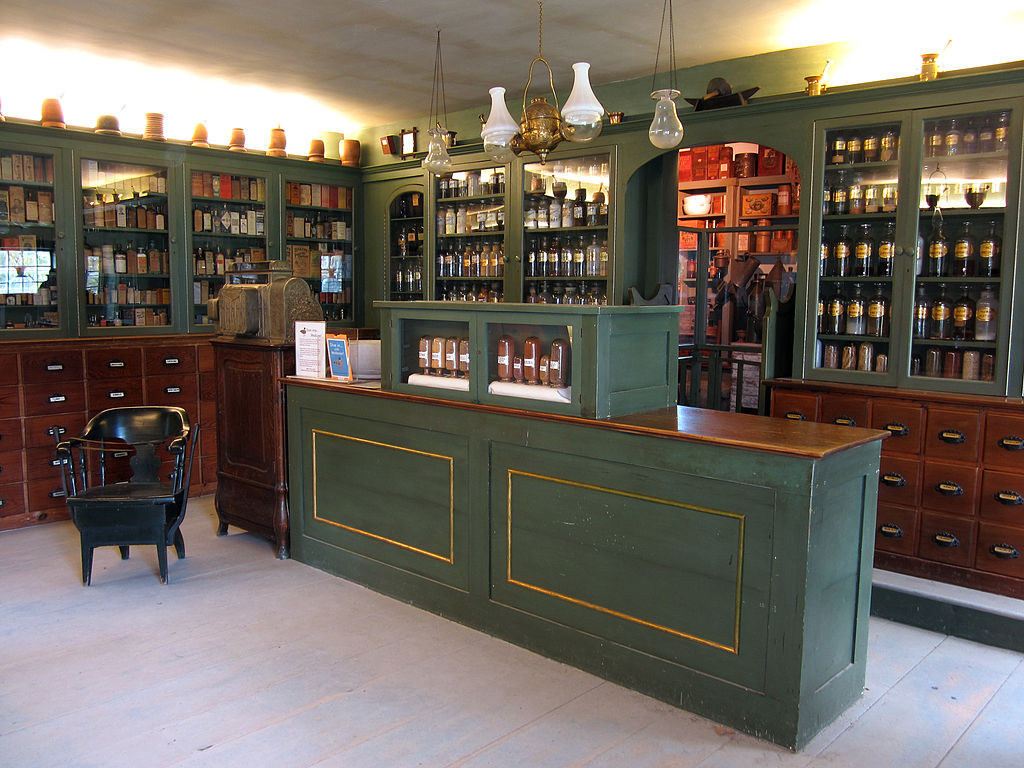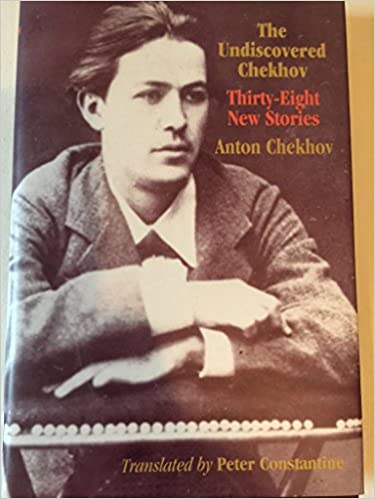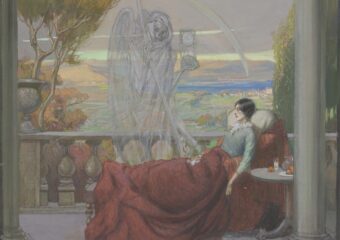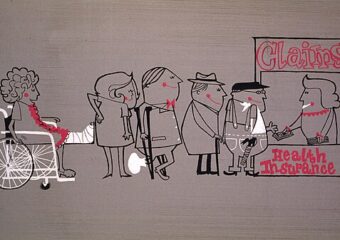Anton Chekhov
Peter Constantine (translator)
In: The Undiscovered Chekhov: Thirty-Eight New Stories
New York
Seven Stories Press
1998
7 pages
According to the Art:
In this short story depicting greed and imperiousness in a Russian pharmacy during the late 1800s, Anton Chekhov is foretelling characteristics that will affect health care in the U.S over a century later.
Synopsis:
Egor Alexeyitch Svoykin was sick. His physician prescribed medicine that a pharmacy would need to prepare. Svoykin felt some relief being in a large Russian city during the late nineteenth century that would have pharmacies he could count on. This feeling of relief dissipated just after he entered the pharmacy and came before the imperious pharmacist there.
The pharmacist eventually raised his head from his newspaper, looked at the prescription, shouted instructions to his assistants, and then returned his gaze to the newspaper while at the same time informed Svoykin that the prescription would be ready in an hour. Svoykin was the only person waiting at such a late hour as it was, and he was deteriorating.
His mouth was on fire; there was a drawn-out pain in his arms and legs; foggy images tumbled about like clouds and shrouded human figures in his heavy head. He looked as if through a veil at the pharmacist, the shelves of jars, the gas burners, and the cabinets. The monotonous pounding in the marble mortar, and the slow ticking of the clock seemed to him to be coming not from the outside but from inside his head.
p. 129
When Svoykin reports to the pharmacist that he is becoming feverish and feeling weaker, “the pharmacist remained stock-still and, leaning his head farther back, kept on reading his newspaper. He didn’t respond to Svoykin with word or movement—it was if he hadn’t heard him.” (p. 130) When Svoykin went back to the counter and pleaded with the pharmacist to hurry the prescription, the pharmacist said, “It’ll be ready soon enough…excuse me, but there’s no leaning on the counter.” (p. 131)
The next half hour was “unbearable” before the prescription came and then made more so by the rituals the pharmacist performed in adorning the prescription container. The pharmacist charged one ruble and six kopecks, but Svoykin was short the six kopecks.
Under the circumstances…I would be grateful if you would let me bring you, or maybe send you, the six kopecks tomorrow…
pp. 132-133
I’m sorry, we don’t accept credit here.
What am I supposed to do?
Go home, get the six kopecks, and then you can have your medicine.
But…I’m having difficulty walking, and I don’t have anyone I can send…
That’s your problem.
Svoykin returned home, though with difficulty. The Kopecks were there on the table, but his illness kept him from returning to the pharmacy.
Analysis:
This story is used in some pharmacy schools to teach good pharmacist-patient communication and professionalism (by contrasting it with very bad communication and very unprofessional behavior). But, the story offers another purpose. If viewed from the perspective of Western health care in the early 2020s, Chekhov is depicting an “access to health care” problem. Svoykin is unable to get the prescription his physician wrote for him. The access problem in this case results from greed and imperiousness, and their effects on professionalism.
Chekhov establishes the greed element when describing what Svoykin sees as he arrives at the pharmacy. Svoykin notes upon entering the pharmacy directly after leaving the physician’s office that “it’s like going from a cowshed into a courtesan’s boudoir!” The staircase he encounters was “polished and covered with an expensive runner,” making him hesitant to set his foot upon it. But, climb the stairs he did, as best as his illness would allow, and proceeded to a “polished yellow counter.” The pharmacist, “from the small bald patch on his head to his long pink fingernails…was painstakingly starched, groomed, licked clean, as if he were standing at the altar.” He is imperious and not to be approached with trivial matters. Svoykin is further “struck by the aroma one finds in every pharmacy in the world. Science and medicine may change over the years, but the fragrance of a pharmacy is as eternal as the atom. Our grandfathers smelled it, and our grandchildren will smell it too.” (pp. 127-128)
This is the picture of an opulent setting only afforded by the high cost of medicines and an uncompromising attention to finances. The pharmacist is not moved by any professional ethos or sworn oath to do whatever he can for a patient who needs his help when that involves his money. Professionalism only goes so far, and it goes as far as the money goes for Chekhov’s pharmacist.
Nearly one hundred and forty years on from when Chekhov wrote this story, access to health care, and certainly access to pharmaceutical products and services, remains a major problem and threat to the health of individuals and populations in the U.S. Given how Chekhov seemed to have no compunction in portraying how a pharmacist in his time could exhibit greed and imperiousness to the disadvantage of people needing his services, I can see Chekhov writing a similar story now about the frustrations people experience trying to get their prescriptions at a pharmacy resulting from the same factors, greed and imperiousness. But he would have to locate them somewhere other than among individual pharmacists, and as a pharmacist long involved in the workings of pharmaceutical access, I can envision where he would point his finger.
People entering most all pharmacies today would not notice any signs of opulence. They would not revel in the fragrances Svoykin encountered; indeed, the smells of the modern-day pharmacy are more likely to repel its clients. As patients approach the pharmacy counter, made of some laminate, not marble, they would not come face-to-face with an imperious pharmacist, but more likely a beleaguered pharmacist struggling to keep up with an unrelenting and overwhelming workload. Few of these pharmacists are owners, most of them work for corporate, publicly-traded entities managed with the uncompromising attention to finances required to meet stockholders’ expectations for returns. These expectations work against staffing levels and support mechanisms that enable pharmacists much professional discretion beyond the operational components of filling prescriptions and administering vaccinations.
I can thus see Chekhov in his modern story framing the actions of corporate pharmacy organizations and their investors, and the structures of the market-based health care system as the greed factor. I can see him transferring his pharmacist’s imperiousness to health care product manufacturers and provider institutions that insist the value of what they offer justifies jaw-dropping and often out-of-reach prices for people without expansive health care insurance, and even when credible health care technology value assessment groups conclude otherwise.
Chekhov was a physician and so in writing this story he was probably reacting to scenarios he knew patients experienced, maybe even himself as a sufferer of tuberculosis. He was exposing a situation in which pharmacists’ greed and imperiousness can overtake their professional obligations and commitments. He could not have known that long after he wrote this story that what he revealed still exists, just in different forms.
Also:
Chekhov’s story pairs nicely with the Raymond Chandler story, It’s All Right–He Only Died, published in The Strand Magazine. In this story, written in the late 1950s, a patient was brought into a private hospital unconscious after a truck hit him, and smelling of alcohol. The presumptive diagnosis was drunkenness, and after a hospital admissions clerk searched the patient’s person for money needed towards a deposit to no avail, she arranged for the patient’s transfer to the county hospital, where, not long after, he died because of delayed treatment for head trauma. There, $4,000 was found inside his undershirt. This story is also indicative of modern-day health care, but clerks search for insurance cards rather than cash before approving admissions. (Both of these stories, along with the novel, The House of God, were featured in an episode of the podcast, The Clinic & The Person, I cohost with Dan Albrant and with executive producer Anne Bentley.)
To pharmacists of a certain age (i.e., mine), Chekhov’s description of the pharmacy reminds us of what drew us into the profession decades ago. The sight of those show globes on the prescription counter, the sound of clinking pestles against the mortars behind the counter, and smell of the tinctures, eutectics, and liniments rising above the counter were utterly entrancing. These iconic features of the pharmacies of old have faded away; they were not as eternal as the atom. On the rare occasion I encounter any of them when walking into a long-established, independent pharmacy (apothecary), they still cast a spell over me.




